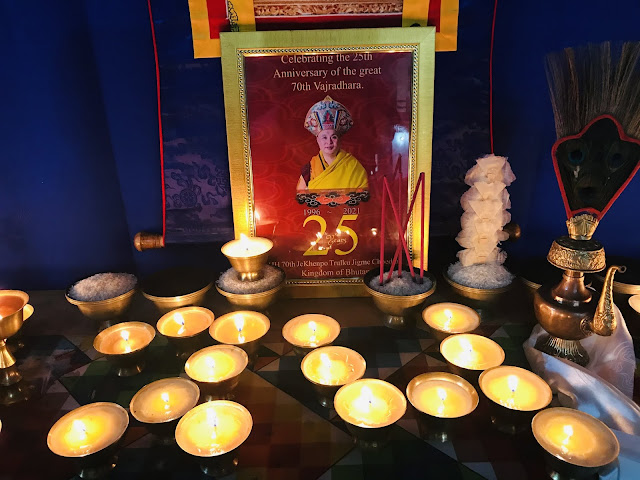Igniting a flame on the wick of an oil lamp is a symbolic act of reminding the presence of Buddha nature, the wisdom mind within each of us and to awaken compassionate thought towards unfortunate beings. This is a practice to deepen our compassion for others, even to our enemies of past, present and possibly to those who will cross our paths in future.
The lamp reminds us the transitory nature of all things, that everything in life begins by a cause, and every effect of the cause ceases through a parabolic curve of life.This flame may succumb to a breeze, weakness of the wick to stand or fail to burn in bad oil before it extinguishes on its own. There is no promise the flame shall remain aflame to the last hilt of the wick. This parallelism govern each man life after life, and life after life we shall never be the same lamp with the same oil and wick. Often some people takes a tangent and cease sooner, like the lamp on the wilderness of life.
What quality of oil, wick and lamp we shall become next depend on the moral and spiritual quality of life we live today. Righteous living, virtuous actions and spiritual thought are central to the quality of life we live today and in the next life. The flame symbolise the ever existing potential for Buddhahood within every being, the wick symbolise the our body, the flesh and bones, and the oil the fluids that gives us life. The lamp is the vessel of this work upon which we live. How we use this lamp, how we devote our life to the earthly life matters much to the quality of life we live.
Would you not aspire to be a gold lamp brimming with butter and a stiff wick than a copper lamp filled with cheap 'Dalda' and a leaning wick? My Lama said 'butter is the best, gold is the greatest.' The choice of our future in how we chose to live today.
How can we garner infinite merit by lighting a single lamp?
It’s a question we don’t think asking about. We do it because it’s associated with something spiritual. While there are many ways to gain greater merit by how we aspire to light a lamp, we can be creative about our visualization and aspiration. Out intentions are important field to gain profound merits.
Visualise that the lamp is made of gold or other precious matter and is as vast as the universe, expanding from horizon to horizon. The oil as a life supporting nectar as voluminous as the seas, and the wick as an indestructible essence of our being. You may also visualize lighting lamps as numerous as the stars in the sky, lighting up the universe with light of awareness and wisdom. You may also visualize that each of these lamps are offered to the Buddhas of the ten directions, and by that effect all the worlds are lighted up by the light of compassion, blessing all being with happiness. The universe becomes a vessel of bliss.What good is this, imagining this way? You may think.
Ever since birth we have learnt to live life in fragmented ways. Duality and multiplicity of life divides and differentiates us from others. There are always you and me, they and me, that and this, not this and not that, the sour and sweet, the past and future, mine and his, and such so. We are unable to transcend the belief that everything is a dream, an illusion, and everything is One. It is impossible to think that everything is transitory and ultimately empty. We have become the dream and and the dreamer, and illusion and a illusionist.
To transcend from the multiplicity of life's delusion, we have to be creative in using symbols and means. Buddhist teaching uses infinite symbols to point to the direction we all seek, the absolute state of freedom from suffering. The lighting of butter lamp is a symbolic act of igniting generosity and compassion.
You know, the true bodhic nature of mind is timeless, spacious, encompassing and beyond mind and matter. This is the state of the oneness of phenomenal life and noumenal world. Thus, the act of visualisation is a simple yet powerful way to practice towards recognising and attaining the omniscient bliss we aspire, to understand and overcome suffering from the perspective of a transcendental wisdom.





0 comments:
Post a Comment